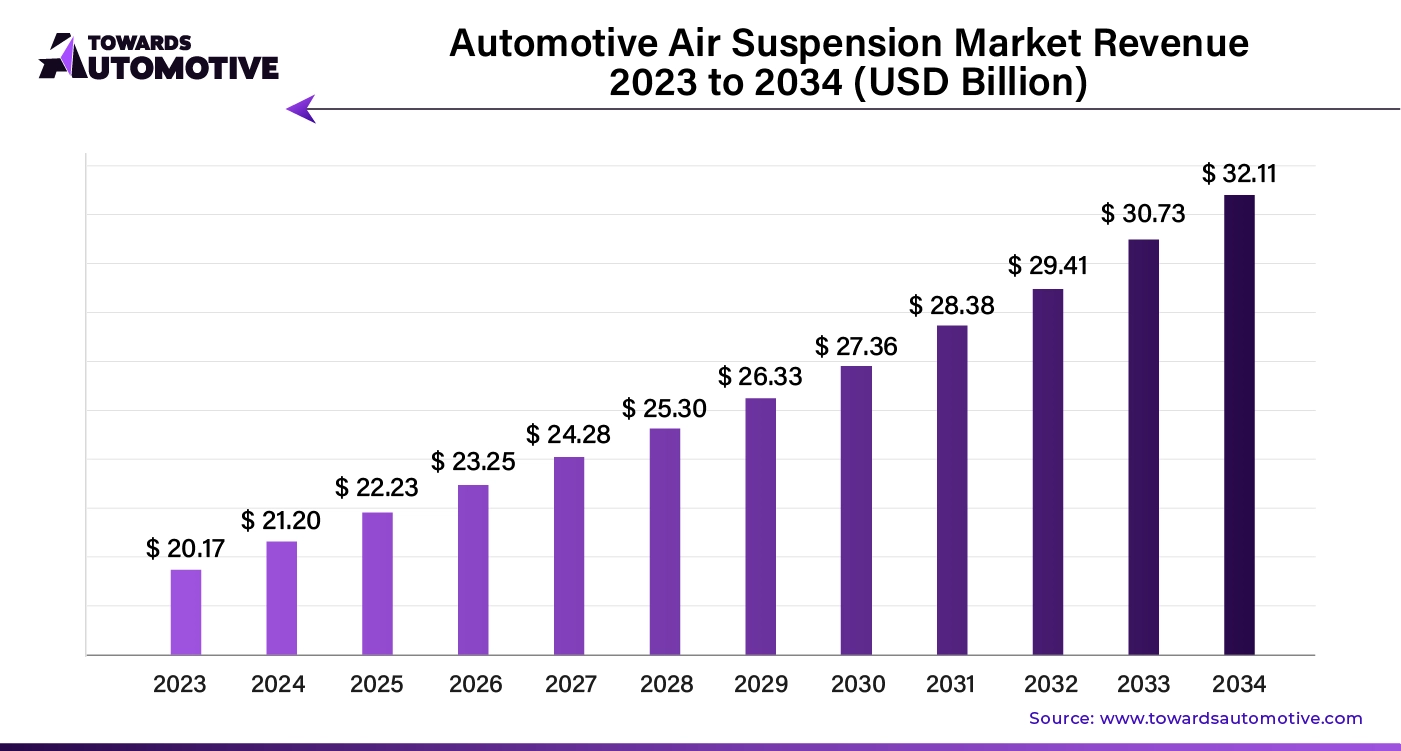The global automotive air suspension systems market is projected to grow from USD 21.20 billion in 2024 to USD 32.11 billion by 2034, reflecting a compound annual growth rate (CAGR) of 4.88% over the forecast period from 2024 to 2034.

Get All the Details in Our Solution – Download Brochure @ https://www.towardsautomotive.com/download-brochure/1003
The automotive industry is witnessing a transformative shift in vehicle suspension technology, particularly within the automotive air suspension market. The emergence of smart suspension systems is creating significant opportunities, revolutionizing how vehicles adapt to varying driving conditions and enhancing overall ride quality. Unlike traditional air suspension systems, smart suspension technology harnesses advanced sensors, artificial intelligence, and real-time data analytics to dynamically adjust suspension settings based on road conditions, load variations, and driving behavior.
Smart Suspension Systems: The Future of Ride Quality
The key distinction between traditional air suspension systems and smart suspension systems lies in their adaptability. Smart suspensions are designed to provide a highly optimized driving experience by automatically adjusting to different terrains, driving conditions, and the vehicle’s load. This dynamic adaptability ensures superior comfort and handling, whether navigating smooth highways or tackling rugged terrains.
The integration of smart suspension systems not only enhances ride comfort but also contributes significantly to improving vehicle stability, safety, and performance. As the automotive industry progresses towards advanced driver assistance systems (ADAS) and autonomous driving technologies, the role of smart suspensions becomes even more critical. By seamlessly interacting with ADAS, smart suspensions help enhance the vehicle’s overall performance, contributing to smoother rides, better handling, and heightened safety.
One of the main advantages of smart suspension technology is its ability to provide personalized ride settings. Real-time adjustments allow drivers to tailor their suspension preferences, creating a more user-centric driving experience. As consumer demand for customization continues to grow, smart suspension systems meet these expectations by offering intelligent, adaptable features that cater to individual preferences.
Market Growth and Key Developments
The automotive air suspension market is experiencing rapid growth, driven in large part by the increasing adoption of smart suspension systems. This shift is revolutionizing the way vehicles interact with the road, making the ride more responsive and personalized. In October 2023, McLaren Automotive made headlines by announcing a deal with Monroe, a key player in suspension systems. Through this partnership, Monroe will deliver smart suspension systems to McLaren for future vehicles, showcasing the growing recognition of the benefits these advanced technologies bring to high-performance cars.
As smart suspension technology continues to evolve, it is expected to drive innovation and growth in the automotive air suspension market, creating new opportunities for manufacturers to meet rising consumer demand for high-performance, adaptable, and intelligent vehicle systems. The ongoing integration of artificial intelligence, real-time data analytics, and sensor technologies into suspension systems signals a future where vehicles are more responsive to both driver preferences and changing road conditions.
Air Springs: The Backbone of Automotive Air Suspension
In addition to smart suspension systems, the air spring segment plays a crucial role in driving the growth of the automotive air suspension market. Air springs are an essential component of air suspension systems, offering superior ride quality by allowing for adjustable suspension settings that enhance vehicle comfort and handling. Unlike traditional coil springs, air springs use compressed air to adjust the suspension’s stiffness and height, providing a smoother, more adaptable driving experience across different road conditions and load scenarios.
The air spring segment has seen substantial growth due to its ability to meet the increasing demand for vehicles with advanced suspension capabilities. Many automakers, especially those producing luxury and high-performance vehicles, have turned to air springs to deliver superior ride comfort, stability, and handling. The integration of air springs with advanced driver assistance systems (ADAS) further boosts their appeal by improving vehicle dynamics and safety features.
As consumer expectations for vehicle performance and comfort continue to rise, the contribution of the air spring segment to the automotive air suspension market is becoming more pronounced. Manufacturers are constantly refining air spring technology to improve durability, efficiency, and overall system performance, positioning air springs as a critical element in the evolution of automotive suspension systems.
Strategic Moves in the Industry
One of the key developments in the air spring market occurred in July 2024, when SI Air Springs announced its acquisition of Roberto Nuti Group. This strategic move is aimed at strengthening the global supply chain for air springs, ensuring that the growing demand for advanced suspension technologies can be met more efficiently. With the increasing adoption of air springs in both luxury and mass-market vehicles, this acquisition will likely enhance SI Air Springs’ ability to deliver high-quality, durable suspension solutions worldwide.
Invest in Our Premium Strategic Solution @ https://www.towardsautomotive.com/price/1003
You can place an order or ask any questions, please feel free to contact us at sales@towardsautomotive.com
Explore the comprehensive statistics and insights on automotive industry data and its associated segmentation: Get a Subscription
For Latest Update Follow Us: https://www.linkedin.com/company/towards-automotive
